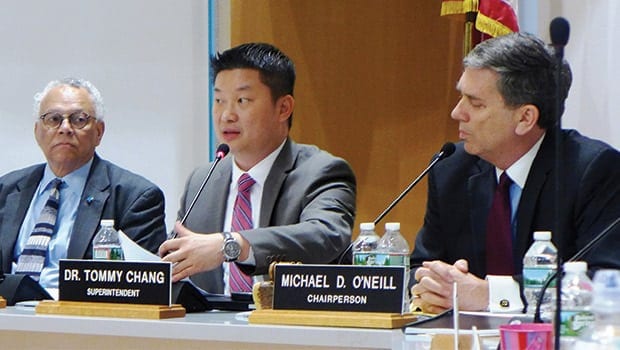School Committee approves BPS budget
Funding proposal called “Lesser of two evils”

The Boston School Committee voted last week to approve the mayor’s latest budget proposal, even as many committee members expressed disappointment with the options before them. The vote followed a charged public testimony session, in which many speakers broke down in tears while a few others railed at the committee and administration of Mayor Martin Walsh.
During testimony, students, parents, teachers and activists voiced objections to any budget resulting in shortfalls. Many said the latest — March — budget proposal risks harming students with special needs.
Still the budget passed, 5-2, with committee members Regina Robinson and Miren Uriarte dissenting. School Committee Chair Michael O’Neill said the committee’s options were limited: Voting no, or not voting, would mean the February budget — which cut millions from high schools and sparked a more than 3,000-student walkout — passes on to the City Council.
“I fundamentally believe this budget is better,” O’Neill said, adding that this latest version restores more funding. The budget received a boost between the March 16 and March 23 committee meetings: more than $197,000 was added to the Opportunity and Achievement Gap Office.
Student representative Savina Tapia, who does not have voting powers, called the March budget “the lesser of two evils.”
After the vote was tallied several audience members burst into boos and cries of “Shame.”
Shortchanging special education
As it stands, amount of funding allocated to cover the needs of children with autism, emotional impairments and unidentified disabilities decreased by $5 million.
Tabitha Kast-McBride, a senior at TechBoston Academy, said she feared her school could lose PATH, a program that provides psychological and academic support, and which she said played a critical role in keeping her in school.
“[There are] students who are emotionally fragile, like me, who might not be here today without PATH,” Kast-McBride said. Teens need emotional-wellness programs to be expanded, not reduced, she said, breaking down as she recalled a friend who had committed suicide.
John St. Amand, vice chair of Boston Special Education Parent Advisory Council, criticized the reasoning behind reducing special education funding — which will affect 19,022 students, he said.
“Was there a report that showed that all of these students were meeting their educational goals?” he said.
Superintendent Tommy Chang assured attendees that this fall, an analysis will be conducted regarding the services provided to students with autism and emotional impairment. Chang said the school department also will reevaluate its formula that determines educational funding allocations for each student, based on needs.
Diploma Plus survives
Charlestown High School was slated to lose Diploma Plus, a program credited with helping many struggling students, primarily black and Latino, to graduate, via smaller classes and tailored curriculum pacing.
At a budget hearing last month, Malik Johnson-Mignott said that before entering Diploma Plus, he was shunted from school to school and had gotten in trouble with police.
“Being a person of color in Boston and being 22 years old at the same time … statistically speaking I should be dead or in jail now,” he said. But, he said, at Diploma Plus, teachers took the time to understand his background and life, and the program helped him turn his life around.
Even with the new budget, which restored much of high school funding, Charlestown High faced a $300,000 shortfall. School administrators expected they would have to cut the program.
Late into the budgeting process, the axe was withdrawn. At last week’s budget vote meeting, Superintendent Chang announced that Liberty Mutual had stepped forward with program funding.
“This would not have been possible without the generous financial support of Liberty Mutual,” Chang said.
During the public testimony, City Councilor Tito Jackson expressed concerns that the city had to resort to a private partner for education funding.
Chance for change
The School Committee vote is not the final word.
The budget is sent to the City Council in April, with councilors’ vote due on June 30. The council cannot increase line items, but often is able to negotiate with the mayor for changes, said Jackson, who chairs the council’s Committee on Education.
Savina Tapia assured attendees that she will keep fighting for more funding, and said the budget is subject to change up until Department of Elementary and Secondary Education sets the final budget in August.
Reflecting on the financial planning, several school committee members said it demonstrated the need for greater analysis of budget impacts and performance. Alexandra Oliver-Davila called for the creation of a budget task force that would provide year-round budget evaluation, instead of waiting until February to hold these conversations. Jeri Robinson asked for an examination the economic stability of high school graduates, to assess if the amount and distribution of funding is supporting students adequately.
“Are we creating the achievement gap through our own practices?” Jeri Robinson said.


![Banner [Virtual] Art Gallery](https://baystatebanner.com/wp-content/uploads/2024/04/Cagen-Luse_Men-at-store-e1713991226112-150x150.jpg)



